Swedish Diplomat Detained In Iran Faces Harrowing Conditions

Johan Floderus, a 33-year-old Swedish citizen and EU diplomat, has been held captive in Iran for the past 18 months, prompting his family to speak out about the severe conditions he faces.

Johan Floderus, a 33-year-old Swedish citizen and EU diplomat, has been held captive in Iran for the past 18 months, prompting his family to speak out about the severe conditions he faces.
With no routine consular visits or phone calls during his 600 days of detention in Tehran's Evin prison, Johan has resorted to hunger strikes at least five times, as revealed by his father, Matts Floderus.
Matts detailed the dire circumstances Johan is enduring in an interview with The Guardian. According to him, Johan is confined to a cell without a bed and compelled to sleep under constant lighting. Routine access to phone calls, books, and essential food supplements has been consistently denied.
Expressing the family's distress, Matts shared his wife's hope for Johan's release in time for Christmas, highlighting the devastating impact of the situation on their lives. He emphasized Johan's arbitrary detention, stating that he has committed no wrongdoing and should be released to leave the country.
He said the Iranians had “taken Johan for no reason” and “should ensure he has full human rights while there and they should release him and let him leave the country right away”.
Iran routinely arrests foreigners and dual citizens to use them as bargaining chips against Western countries. The United States released $6 billion of Iran's blocked funds this year to free five hostages.
Johan, an alumnus of Oxford, previously worked on the Afghanistan desk of the EU’s external services department. He was detained on April 17, 2022, in what seems to be a deliberate strategy by Iranian authorities, possibly aimed at leveraging his release against Iranian prisoners in the West or extracting financial concessions.
Johan's family awaits an imminent court hearing in December to learn of the charges against him.

Iran-backed militias in Iraq and Syria launched 10 fresh attacks on US targets Friday, as Tehran uses its proxies in the region to pressure Washington.
The militias have carried out more than 80 such attacks since mid-October, when Israel’s onslaught on Gaza began. But the Biden administration has largely avoided retaliation, drawing stark criticism from Congressional Republicans.
“How many attacks on American personnel and facilities by Iranian-backed militias in Iraq and Syria will be tolerated before we hold Iran accountable,” Senator Lindsey Graham asked on his X account.
“We have lost all deterrence as a nation,” he said. “The Biden Administration is letting our men and women in uniform down and putting them at risk by not challenging Iran directly.”
The Biden administration has been trying to avoid conflict with Iran ever since Hamas forces attacked Israel, fearing that the war on Gaza could expand and set the whole region ablaze.
Secretary of defense Lloyd Austin spoke Friday with the Iraqi Prime Minister Mohammed Shia al-Sudani reminding him of Iraq's obligation to protest diplomatic missions and "Coalition advisers and facilities." He emphasized that the US reserved the right to self-defense.
The attacks Friday were a mix of drones and missiles, targeting American bases and the US embassy in Baghdad –a first since October, marking a clear escalation of operations by Iran proxies in Iraq and Syria, who seem to have taken over from Houthis in Yemen.
The Houthis robbed the spotlight last week with several attacks on commercial vessels in the Red Sea and forcing two US warships to engage.
A senior White House official blamed Iran’s Revolutionary Guards (IRGC) for Houthi actions.
"We believe that they are involved in the conduct of these attacks, the planning of them, the execution of them, the authorization of them and ultimately they support them," deputy national security adviser Jon Finer said.
He added that the Biden administration has “not ruled out the possibility of taking military action” against the Houthis.
On Friday, Bloomberg reported that the administration “has been consulting with Gulf allies about potential military action” against Houthis.
The report suggested that the talks were at a “preliminary stage” and both the US and partners still favored diplomacy over direct confrontation, especially since any military action can jeopardize the renewed relationship between Iran and Saudi Arabia, which the Biden administration values as essential to the peace and stability in the region.
It seems unlikely, however, that the regime in Tehran or its regional proxies would change course unless they felt the heat.
“Retaliate yes and soon but the target must be something dear to Iran,” said Douglas London, a former CIA expert and a non-resident scholar at the Middle East Institute’s Countering Terrorism & Extremism program. “Little value in hitting the Houthis or Iraqi proxies apart from capability reduction since their casualties are expendable to Iran.”
The hardliners in Iran –including the Supreme Leader Ali Khamenei himself –believe the recent events to be in line with their interests and their long-term vision for the region.
The ongoing attacks in Iraq, Syria, and the Red Sea are likely intended to push the Biden administration to call for a ceasefire in Gaza. But they may also be intended to wreak havoc in the region, shifting American public opinion and eventually forcing US troops out or at least diminishing their presence.
In all this, the confusion and the dithering of the Biden administration can play the role of an unintended catalyst.

Iranian media is still buzzing with the unfolding details of a colossal corruption case involving nearly $3.5 billion and key Islamic Republic figures.
The number of officials implicated in the case is so high that the blame game has become very complicated. Iran’s economy is plagued by corruption cases that seem systematic and often work like this: An official with a network of other regime insiders manages to secure foreign currency for international trade at discounted government rate and then sells it in the black market.
Whenever such cases are revealed, the authorities usually cope out of responsibility by blaming former administrations or officials from the opposing political camp. However, the $3.5 billion embezzlement case of Debsh Tea Company involves officials from both the current and the previous presidential administrations -- including ministers of agriculture, industry as well as the governors of the Central Bank of Iran and the chiefs of Iranian Customs Administration. It has also led to discord between the judiciary and the presidential administration as well as the parliament.
Apart from the accusations of corruption between reformist and conservative factions, the government and the judiciary also disagree on how to manage the scandal. President Ebrahim Raisi has called for this case not to become "political," a code in Iranian politics for burying an issue. Raisi called for the coverup after reports revealed his administration’s part in the case. Some reports say that until 2020 the annual budget allocated for importing tea was around $300 million, but the budget suddenly tripled in 2021 without any justification. Iran International has also learned that former Agriculture Minister Javad Sadatinejad, was removed by Raisi in mid-April in relation to the case.
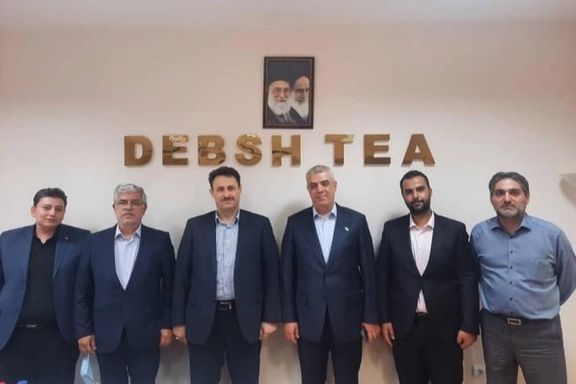
Debsh company, handling most of the country's tea imports, received a staggering $3.37 billion in foreign currency from the government on a preferential exchange rate for tea and machinery imports from 2019 to 2022. However, it has allegedly sold $1.4 billion of the currency on the free market at a higher rate. The company also sold low-grade tea imported from Kenya as high-grade tea originating from India, with a $12 difference per kilogram. The company has been also involved in what has been described as fraud by re-importing cheaper Iranian tea and pocketing the difference in foreign currency.
Iran’s Chief Justice Gholam-Hossein Mohseni-Eje said Thursday that "The government has reported the dismissal of 60 individuals in this case, but these individuals have not been named." A few hours later, government spokesman Ali Bahadori Jahromi said that the dismissal of 60 managers in the past two years is not only over this particular case. Jahromi said earlier this week that several low and mid-ranking officials have been arrested over the case. The CEO of the company, Akbar Rahimi, is reportedly under arrest too. No reports about the details of these arrests and dismissals have been shared with the media and it is not even known if any court hearing was held.
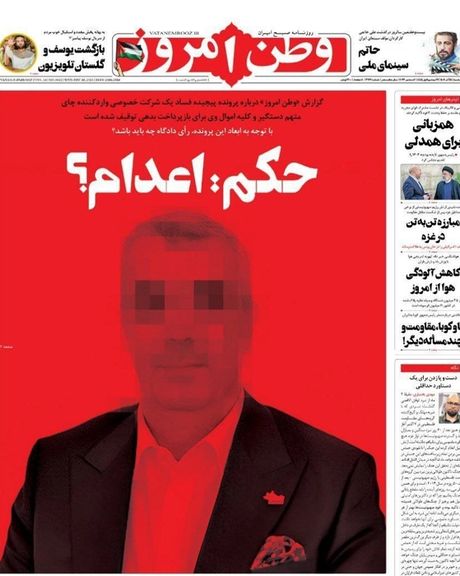
Although top officials, including Supreme Leader Ali Khamenei, claim that corruption in the country is not systematic, the case of Debsh tea company could not have been allocated $3.5 billion while the total consumption of tea barely hits $300 million. According to former editor of conservative Kayhan daily, Mehdi Nasiri, such a large amount of corruption is not possible in Iran without the involvement of top officials and Khamenei's office.
The scandal has enraged Iranians who are suffering from a wide range of economic problems as well as shortages of medicines and some food items as the government has failed to lower inflation, currently above 50 percent.
Iran's top Sunni cleric Mowlavi Abdolhamid said during his Friday sermon that Islamic Republic officials acknowledge the extensive prevalence of corruption, which has reached a point where they are unable to curb or eradicate it. He stressed the necessity for fundamental changes to combat corruption, echoing the people's outcry that past policies have proven ineffective. The outspoken leader of Iran's Sunnis referring to the tea scandal said, "Corruption has become so widespread that some have dared to embezzle this amount for themselves."
Underlining that such a huge corruption case is not possible without the knowledge or coordination of senior officials, reformist Etemad newspaper says, “The main problem is that, aside from a general headline, no details have been released about the highest authorities involved.”
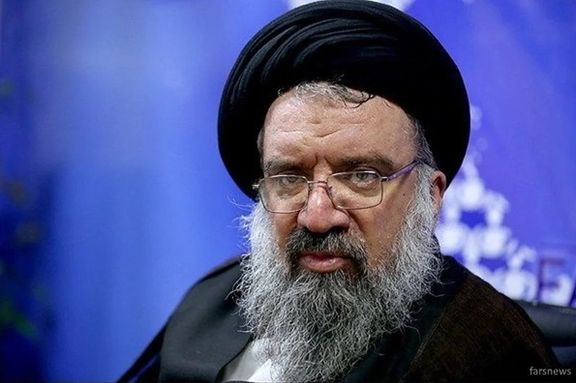
Senior cleric Ahmad Khatami has justified attacks by the militant group against Israel as a legitimate form of defense, speaking in a Friday prayer sermon in Tehran.
Khatami claimed such action aligns with the teachings of the Quran, saying: "May God bless your hands! Strike Israel because your striking is worship."
The sermon comes as tensions in the Middle East escalate amid the ongoing Hamas-Israel conflict, which began two months ago.
Iranian authorities have been issuing a series of inflammatory statements in recent weeks, warning both Israel and its ally, the United States, of the response should attacks on Gaza persist.
The Friday prayer leader in Mashhad, Ahmad Alamolhoda, echoed the words of his counterpart in Tehran, saying: "Fortunately, today the resistance movement has encompassed the majority of the region, and we witnessed the resistance's attacks on Israel during the Gaza war."
Commenting on the global impact of the “Al-Aqsa storm”, as the October 7 massacre by Hamas of around 1,200 Israelis has been dubbed, Alamoldha said: "Today, the whole world realized that America is a child killer and a devil regime."
Alamolhoda holds a significant position as the Supreme Leader Ali Khamenei's representative in Mashhad, a city of high Shiite importance. He is also the father-in-law of President Ebrahim Raisi, who assumed office in 2021 after being handpicked by Khamenei in a tightly controlled electoral process.
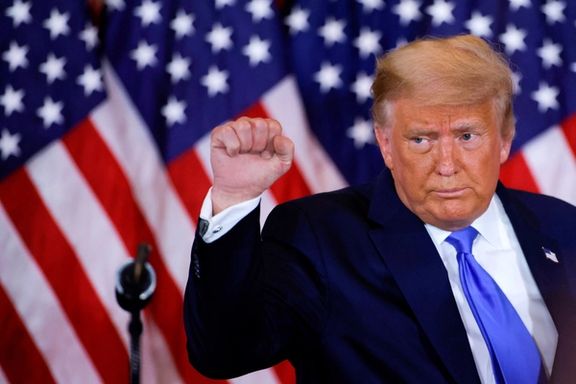
As two major corruption cases became the main headlines in Iran this week, the minister of economy blamed economic stagnation on “Trump’s sanctions.”
Ehsan Khandouzi, speaking to university students, reluctantly admitted that successive administrations have mishandled the economy, but insisted that US sanctions imposed in 2018, wiped out economic growth and “led to today’s high inflation.”
“The sanctions during the Trump era caused the country's economy to decline, and inflation is now the legacy of the sanctions in recent years. These sanctions have affected the purchasing power of households,” Khandouzi insisted.
No one truly knows the real annual inflation rate, since the government stopped issuing periodic reports in 2019, but occasional figures announced by officials show that inflation is above 50 percent, and food prices have increased much faster.
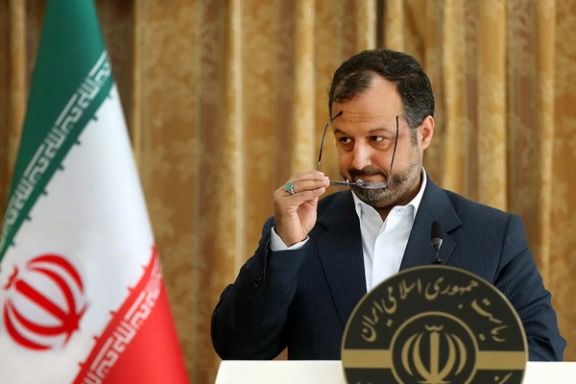
Khandouzi referred to 2011, when he said the national income had reached an all-time high, but he did not mention that skyrocketing oil prices were the reason why the country had disposable income more than a decade ago. In contrast, currently there is not enough foreign currency to import raw materials for producing medications and people must go from pharmacy to pharmacy to find a can of baby formula.
One student asked the minister if “you want to drag everyone into poverty,” to which the minister gave a condescending answer. “When I was a student like you 25 years ago, I was also a critic, but one expects students to ask more sophisticated and analytical questions,” Khandouzi replied. He then went on to tell the students that the ministry of economy has set up a summer school and they are welcome to attend the courses and learn economics.
Meanwhile, the minister admitted that the Islamic Republic in the past 20 years has completely mishandled its banking sector and now several institutions are on the verge of bankruptcy. He also acknowledged that the government is afraid of protests if banks go under, and depositors demand their money. For this reason, the government prefers to dissolve these institutions into the Central Bank of Iran, a strange arrangement for any country.
However, Khandouzi did not mention that there no true private sector banks in Iran. The so-called non-governmental banks are in fact institutions set up by public entities or by regime insiders who have political influence and therefore have immunity from supervision.
Insider dealings became once again public scandals this week. A company dealing with tea imports misused up to $3.5 billion it received from the government at preferential rate of exchange. Instead of importing tea and machinery as expected, the company sold dollars on the open market at much higher rates. Despite pledges by top officials to investigate and address the fraud, so far, no prominent person has been detained. Some local media outlets say that without the complicity of top officials such a fraud would not have been possible.
At the same time, members of Tehran’s municipal council are asking about more than $300 in city revenues that has “disappeared”, meaning there is no trace of the money in budget allocations. This is a substantial sum of money in Iran, equaling 170 trillion rials.
The minister of economy did not address the corruption scandals during his meeting with the students. He tried to argue that the economy has improved in the past two years during the reign of hardliners. President Ebrahim Raisi also presented rosy figures to parliament earlier this week. One lawmaker commented after the meeting that “The president seemed to be talking about a different country.”
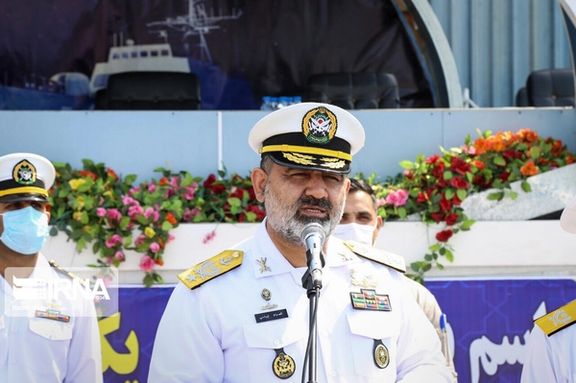
The commander of Iran’s navy has claimed it is maintaining “maritime security” in the region amid allegations of the Islamic Republic’s involvement in Houthi attacks on shipping.
Admiral Shahram Irani was speaking on Friday as he announced plans for a regional naval coalition and upcoming large-scale naval exercises involving other countries along southern coasts, with additional exercises slated for the Caspian Sea region.
He said his Navy has a strategic plan to be present in the oceans, adding that “maritime security in the region is firmly established under the Islamic Republic system.”
It comes after a number of recent incidents in which shipping in the Red Sea has been targeted by Houthis.
Since the deadly clash between Hamas and Israel on October 7, the Yemen-based rebels have launched multiple drone and missile attacks on US and Israeli targets in the region. Despite accusations against Iran, the Biden administration, having removed the Houthis from the US terrorist list, has not responded to the maritime attacks.
The Houthi attacks followed Iranian leader Ali Khamenei's call to stop oil and food shipments to Israel. Controlling most of Yemen's Red Sea coast, the group had previously targeted Israel with ballistic missiles and armed drones.
While Iran has avoided direct involvement in the Israel-Hamas conflict, it allegedly employs proxy groups like the Houthis and Hezbollah to target Israel and US interests in the region. In response to Iran's actions in the critical maritime route of the Strait of Hormuz, the Pentagon deployed a portion of the Bataan Amphibious Readiness Group accompanied by a Marine expeditionary unit.
Over the past two years, Iran has been implicated in attacks, seizures, or attempted seizures of nearly 20 internationally flagged merchant vessels in the vital global shipping passage of the Strait of Hormuz, according to reports from US Central Command, responsible for overseeing operations in the Middle East region.